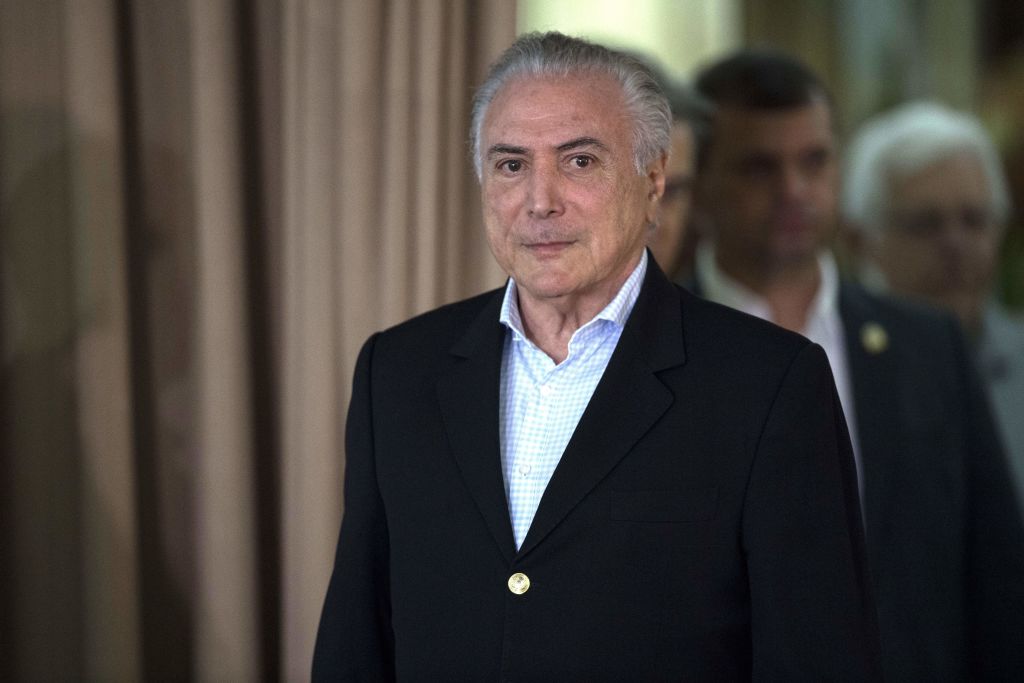Brazilian lawmakers vote to block corruption trial for President Michel Temer


A free daily email with the biggest news stories of the day – and the best features from TheWeek.com
You are now subscribed
Your newsletter sign-up was successful
The lower house of Brazil's Congress voted Wednesday to block corruption charges against President Michel Temer, with critics of the embattled president falling far short of the 342 votes needed to suspend him and send him to trial before the Supreme Court. In June, Temer became the first sitting president charged with criminal activity, in this case corruption for allegedly receiving $12 million in bribes including $150,000 from a meatpacking magnate. He has worked hard to shore up his support in the Chamber of Deputies since the charges emerged, channeling $25 million in public funds into lawmakers' pet projects and reshuffling his Cabinet based on which parties in his governing coalition supported him.
In the end, 227 lawmakers voted to suspend Temer and send his case to trial, 263 voted against the measure, and 22 abstained. A recent poll found that 80 percent of Brazilians want Temer tried, and his approval rating sits at about 5 percent. Many lawmakers who voted to spare Temer said they were doing it mostly to stabilize Brazil's economy and government; his predecessor, Dilma Rousseff, was impeached last year over alleged budget shenanigans, and last month a judge sentenced popular former President Luiz Inácio Lula da Silva to nine years in prison, a verdict he is appealing.
Temer insists he will stay in office until his term ends in December 2018, though more charges are expected to be filed against him, requiring another vote in Congress.
The Week
Escape your echo chamber. Get the facts behind the news, plus analysis from multiple perspectives.

Sign up for The Week's Free Newsletters
From our morning news briefing to a weekly Good News Newsletter, get the best of The Week delivered directly to your inbox.
From our morning news briefing to a weekly Good News Newsletter, get the best of The Week delivered directly to your inbox.
A free daily email with the biggest news stories of the day – and the best features from TheWeek.com
Peter has worked as a news and culture writer and editor at The Week since the site's launch in 2008. He covers politics, world affairs, religion and cultural currents. His journalism career began as a copy editor at a financial newswire and has included editorial positions at The New York Times Magazine, Facts on File, and Oregon State University.
-
 How the FCC’s ‘equal time’ rule works
How the FCC’s ‘equal time’ rule worksIn the Spotlight The law is at the heart of the Colbert-CBS conflict
-
 What is the endgame in the DHS shutdown?
What is the endgame in the DHS shutdown?Today’s Big Question Democrats want to rein in ICE’s immigration crackdown
-
 ‘Poor time management isn’t just an inconvenience’
‘Poor time management isn’t just an inconvenience’Instant Opinion Opinion, comment and editorials of the day
-
 ABC News to pay $15M in Trump defamation suit
ABC News to pay $15M in Trump defamation suitSpeed Read The lawsuit stemmed from George Stephanopoulos' on-air assertion that Trump was found liable for raping writer E. Jean Carroll
-
 Judge blocks Louisiana 10 Commandments law
Judge blocks Louisiana 10 Commandments lawSpeed Read U.S. District Judge John deGravelles ruled that a law ordering schools to display the Ten Commandments in classrooms was unconstitutional
-
 ATF finalizes rule to close 'gun show loophole'
ATF finalizes rule to close 'gun show loophole'Speed Read Biden moves to expand background checks for gun buyers
-
 Hong Kong passes tough new security law
Hong Kong passes tough new security lawSpeed Read It will allow the government to further suppress all forms of dissent
-
 France enshrines abortion rights in constitution
France enshrines abortion rights in constitutionspeed read It became the first country to make abortion a constitutional right
-
 Texas executes man despite contested evidence
Texas executes man despite contested evidenceSpeed Read Texas rejected calls for a rehearing of Ivan Cantu's case amid recanted testimony and allegations of suppressed exculpatory evidence
-
 Supreme Court wary of state social media regulations
Supreme Court wary of state social media regulationsSpeed Read A majority of justices appeared skeptical that Texas and Florida were lawfully protecting the free speech rights of users
-
 Greece legalizes same-sex marriage
Greece legalizes same-sex marriageSpeed Read Greece becomes the first Orthodox Christian country to enshrine marriage equality in law
